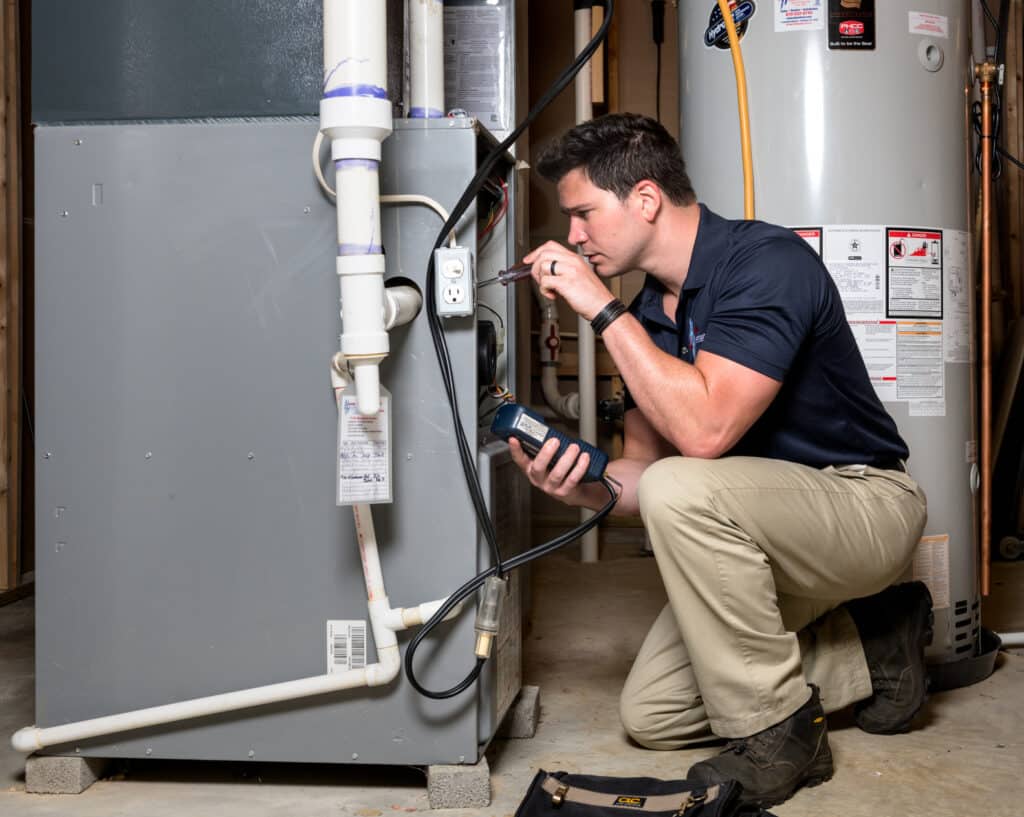Date: November 8, 2023
A furnace is a device used to heat and cool buildings. It works by transferring heat energy from a fuel source, such as natural gas, oil, electricity, wood, or propane, to the air in the home. Furnaces are an integral part of many homes and businesses and their lifespan can be affected by a variety of factors including maintenance routines and repairs, location, size of the unit and more.
This article will discuss the different types of furnaces available on the market today, signs that your furnace may be failing and factors that can affect its lifespan. Champion Services is Evanston, WY and Ogden, UT’s go-to plumbing and HVAC company with over 38 years of experience in providing top-notch services at a fair and reasonable price point! We provide heating, air conditioning, plumbing and electrical repairs, maintenance new installations and replacements.
Thesis Statement
This article will provide an overview of the different types of furnaces available on the market today as well as an analysis of the various factors that can influence their lifespan.
Gas Furnaces
Gas furnaces are the most popular type of furnace used in homes today. They use natural gas or propane as fuel to heat air, which is then distributed through a home’s ductwork system. Gas furnaces come in two types: single-stage and two-stage models. Single-stage models turn on at full power when they sense a drop in temperature, while two-stage models have a lower setting that can be used for more moderate temperatures and will only switch to the higher setting when necessary.
Electric Furnaces
Electric furnaces use electricity to generate heat, which is then distributed through the home’s ductwork system. electric furnaces are generally less expensive than gas furnaces but can be more expensive to operate due to their higher energy consumption. While electric furnaces are becoming less popular due to their cost, they are still an option for homeowners who prefer not to use natural gas or propane in their homes.
Oil-Fired Furnaces
oil-fired furnaces are similar to gas furnaces but instead use oil as their fuel source. These furnaces are typically found in older homes and require regular maintenance and inspections due to the combustible nature of oil. Oil-fired furnaces also tend to be more expensive than other types of furnace and require more frequent repairs due to their age and complexity.
Heat Pump Furnaces
heat pump furnaces combine both heating and cooling capabilities into one unit, making them a great choice for those looking for an efficient HVAC system. Heat pumps move warm air from inside the home into cooler areas outside during the summer months, and vice versa during the winter months. This process helps reduce energy costs as it does not require additional energy input like traditional heating systems do.
Propane Furnaces
propane furnaces are similar to gas furnaces but use propane instead of natural gas as their fuel source. Propane is often seen as a cleaner burning fuel source than natural gas, making it a great option for those looking for an environmentally friendly option for heating their home. Propane is also typically cheaper than natural gas, making it an attractive option for those on a budget.
Wood-Burning Furnace
Wood-burning furnances are an increasingly popular choice among those looking for an alternative way of heating their homes without relying on traditional fossil fuels such as natural gas or propane. Wood-burning stoves provide warmth by burning wood logs or pellets in a contained environment, producing heat that is then circulated throughout the home via ductwork or fans.
Pellet-Burning Furnace
Pellet-burning stoves are similar to wood-burning stoves but burn compressed pellets made from sawdust and other renewable materials instead of logs or wood chips for fuel. Pellet stoves offer many of the same benefits as wood stoves while being easier to maintain and requiring less manual labor when it comes time to refuel them with new pellets every few days or weeks depending on usage levels.
Solar Powered Furnace
Solar powered furnances make use of solar panels installed on the roof of your home that capture sunlight and convert it into usable electricity that can be used by your furnace fan motor or blower motor to circulate warm air throughout your home during colder months without relying on traditional fossil fuels like natural gas or propane for energy input like traditional heating systems do. Solar powered systems can also help reduce monthly energy bills since they don’t need any additional energy input beyond what’s already available from sunlight hitting your roof each day!
Geothermal Heat Pumps
Geothermal heat pumps make use of geothermal energy located deep within the Earth’s surface by using pipes filled with water that run between underground wells and your home’s existing HVAC equipment (such as your furnace) to transfer heat from one location (the ground) to another (your house). Geothermal systems can be extremely efficient since they don’t rely on external sources such as electricity or fossil fuels like traditional heating systems do, helping reduce monthly utility costs significantly over time!
Hybrid Systems
Hybrid systems combine two different types of HVAC technology into one system – usually combining either a geothermal heat pump with a traditional furnace/boiler setup or combining solar panels with a conventional HVAC system – allowing you to take advantage of both technologies’ efficiency benefits without having two separate systems installed in your home! Hybrid systems can help reduce monthly utility costs even further compared to traditional HVAC setups since you’re essentially taking advantage of both technologies’ efficiency benefits at once!
At Champion Services we understand how important it is for our customers here in Evanston WY & Ogden UT area have access to reliable heating options all year long! We offer installation services for all types of HVAC equipment including all types of furnace mentioned above so if you’re considering replacing your existing furnace give us call today!
Signs Your Furnace is Failing
The signs of a failing furnace are not always obvious, but there are some common indicators that can alert homeowners to the need for repairs or replacement. In some cases, the furnace may be beyond repair and require complete replacement.
Yellow Flames in the Furnace
One of the most common signs of a failing furnace is yellow flames in the burner chamber. This is caused by an incomplete combustion process, which occurs when the fuel and air mixture is off balance. If this issue is not addressed, it can cause carbon monoxide poisoning and other dangerous conditions.
Irregular Noise from the Furnace
Another sign that your furnace needs attention is irregular noise coming from it during operation. This could include loud banging, popping or rattling sounds that indicate something inside the unit has become loose or worn out over time. Ignoring these noises can lead to further damage to your system and should be addressed as soon as possible.
Increase in Energy Bills
If you have noticed an increase in your energy bills without any changes to your usage patterns, this could be a sign that your furnace is no longer running efficiently and needs attention from a professional HVAC technician. An inefficient furnace will use more energy than necessary to heat your home and result in higher costs on your monthly utility bill.
Factors Affecting Furnace Lifespan
When it comes to furnace lifespan, there are several factors that can affect how long your furnace will last. The most important factor is the maintenance and repairs you perform on your furnace. By having regular maintenance and repairs done, you can extend the life of your furnace significantly. Other factors such as location, size of the unit, and type of fuel used can also have an impact on how long your furnace will last.
Maintenance Routines and Repairs
The most important factor in determining the lifespan of a furnace is the amount of maintenance and repairs done on it. Regular maintenance will help ensure that all parts are working properly and will help prevent any major issues from occurring. This includes changing air filters regularly, inspecting for rust or corrosion, cleaning ducts, checking for gas leaks, and more. Additionally, if any problems are identified during routine maintenance, they should be addressed immediately with professional repair services to avoid further damage to the unit.

Location
Another factor that affects a furnace’s lifespan is its location. If a furnace is located in an area that experiences extreme temperatures or high humidity levels throughout the year, then it may not last as long as one located in a more moderate climate. Additionally, furnaces located in areas prone to power outages or other natural disasters may not last as long due to the increased stress put on them from these events.
Size of the Unit
The size of a furnace can also play a role in its lifespan. A larger unit may be able to handle more wear and tear over time than a smaller one because it has more space for components to work efficiently without becoming overworked or damaged quickly due to strain from too much use or age-related wear and tear. On the other hand, a smaller unit may require less energy to run but could still fail prematurely due to lack of space for components to work properly or age-related wear and tear over time.
In conclusion, there are several factors that affect furnace lifespan including maintenance routines and repairs, location, size of the unit, type of fuel used, and more. By understanding these factors and taking steps to maintain your furnace regularly with professional services like those offered by Champion Services in Evanston WY & Ogden UT., you can extend its lifespan significantly while ensuring optimal performance year round!
Conclusion
At Champion Services, we understand that furnaces are an integral part of a home’s heating system. It is important to know the types of furnaces available and the signs of a failing furnace in order to make an informed decision when selecting one for your home. Additionally, understanding the factors that affect furnace lifespan can help you make sure your furnace lasts as long as possible.
Maintenance Routines and Repairs
The most important factor affecting furnace lifespan is maintenance. Regularly scheduled maintenance and repairs can help keep your furnace running efficiently and extend its life. At Champion Services, our experienced technicians can provide regular maintenance services to ensure your furnace is working properly and safely.
Location
Another factor that affects furnace lifespan is location. If a furnace is located in an area with high levels of humidity or dust, it will require more frequent cleaning and maintenance than one located in an area with low levels of dust or humidity. Our technicians can advise you on how best to maintain your furnace based on its location in order to extend its lifespan.
Size of the Unit
Finally, the size of the unit also affects furnace lifespan. A larger unit may be able to handle more wear and tear over time than a smaller unit, but it may also be more expensive to operate due to higher energy costs. Our technicians can help you select the right size unit for your home based on your budget and energy efficiency needs.
At Champion Services, we take pride in providing top-notch services at a fair and reasonable price point! We are Evanston, WY and Ogden, UT’s go-to plumbing and HVAC company, family-owned and operated since 1982. We’re on call day and night ready to assist with your HVAC, plumbing or electrical repairs, maintenance, new installations and replacements. Contact us today for all of your heating, air conditioning, plumbing or electrical needs!

